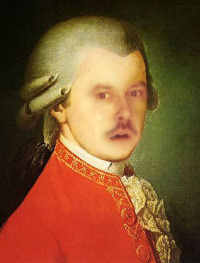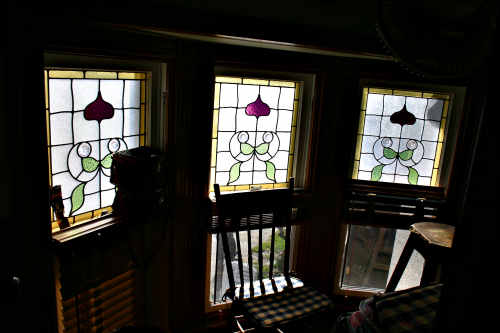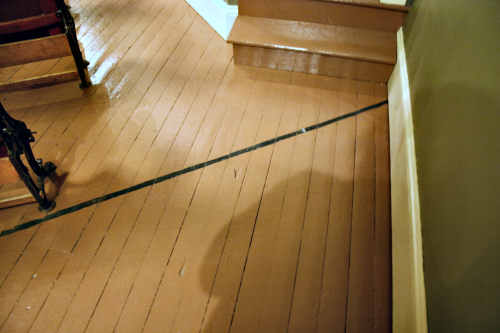A 365-Day Project
"We Are All Mozart"
A project to create
new works and change
the perception of the
music of our time.


 August 25, 2006
August 25, 2006 
This morning a note arrived from Robert Bonotto, part of which read, "one of the arguments against electroacoustic music is that it 'always replays the same' ... but the audience's receiving antennae are mutable."
Although there have been many reflections on audiences in these commentaries -- especially the 'ten audiences' -- the idea that audiences can change has been elided.
Most readers know that I live in the countryside. It's less rural than it once was as houses slowly build up around us, but the character of the population hasn't changed much in the past generation. People who arrive from the city looking for urban high culture aren't going to find much familiar. We have a commercial classical radio station that's still losing money but is a personal passion of the native Vermonter who founded it, and we have an NPR affiliate with its classical clearinghouse and jazz lite programming. There are orchestras, even a professional part-time orchestra that's the oldest statewide symphony in the U.S. We've got jazz and reggae festivals and a few commendable music halls that have been renovated over the past few decades. Chandler Music Hall in Randolph is all late Nineteenth Century wood, and was one of the first to recover from neglect. The opera houses sprinkled across the state were popular show & music halls until classical music made its way up from the grassroots during the exurban movement of the Nineteen Seventies: the expansive Barre Opera House, glittering anew upstairs over the police station, with the fundraising prize of a Steinway grand; the brick and hardwood Vergennes Opera House that sparked a downtown resurgence in Vermont's broad western valley; the slowly recovering Briggs Opera House in the once-flourishing railroad center of White River Junction, still a stop on the Amtrak route; and the Haskell Opera House and Library in Derby Line, where the hall is split by a diagonal black line through the seating -- one side is Canada, the other the U.S. There are the square dancers and line dancers and cloggers and even some ballroom dancers. Easygoing early music ensembles and Sacred Harp choruses abound. There are talent shows and a handful of restaurant harpists -- and the majority of listeners attend to 'adult contemporary' and country & western music.
And therein are found the greatest challenges and greatest opportunities to Robert's listener, in a test bed, the countryside, where choices are few and listeners are still mutable.
The most significant challenge is inexperience, because although the urban realm is the revelation zone for groundbreaking approaches in most genres, conversely most listeners are outside cultural hubs and are instead influenced by their heritage and their family and their local education and likely their church, no matter whether recordings, radio, television, cable, and the internet come into that experience via a kind of two-dimensional viewport. Through that viewport the countryside receives contorted ripples of urban art reflected from its nearest cities. (Yes, this is a generalization -- but it was certainly true in the pre-internet era, because groundbreaking artists outside cities would migrate to them for performance and distribution. A change is underway for artists, if not for audiences.)
The most significant opportunity is also inexperience, because the large cities build artistic pockets and their attendant niche audiences -- and sometimes an overwhelming ennui. Yes, this has already been noted here, but the opportunity suggests why, just possibly, the classical realm once had more broadly popular audiences. The limitation of choices opens the ears and mind and enhances the critical sensibility. Unique experiences are memorable, first experiences are memorable -- and both are an indelible part of life beyond the urban horizon. Consider that choice in large stores is premised not upon quantity, but upon selectivity -- "consumers don't want choices; they want what they want," as it was told to me by the CEO of a major supermarket discounter. That is the product of the supermarket analog to city life.
It's difficult to assemble this coherently. Depending on how far from a cultural hub you are, you will read my words with increased comprehension. Here it is: We prize gold and diamonds as much for their rarity as their utility. We are delighted by the blue M&M among the brown and the red and the yellow. We stop to pick up a glittering stone for its difference as much as its beauty. The red dress gives us pause. The concert -- no matter what its content -- is that gold or diamond, blue candy, glittering stone, red dress. If there are many diamonds or blue candies or glittering stones or red dresses, our eyes fail to see and we are monotonized by choice. Our sensibility is dulled, our choices are cavalier. But one. The one. That night. Those sounds. Yes, those we remember.
Rarity increases our critical sensibility because we have a model around which to form other experiences. Never mind that the first recording of Bach's first Brandenburg to come to my ears was objectively a dullish, lumbering Italian orchestra of the late Nineteen Fifties. It was memorable, placing a marker on the map of my musical experiences. The first recording, the first concert, these are the first loves. And with music we are serial monogamists, loving each piece as we hear it -- until the next one. But if they come too fast, if there are too many, we become tainted, sluttish by excess.
It's late, and my thoughts are slipping away.


Top: Ticket booth at the Derby Line Opera House. Bottom: Canada is on the other side of the line.